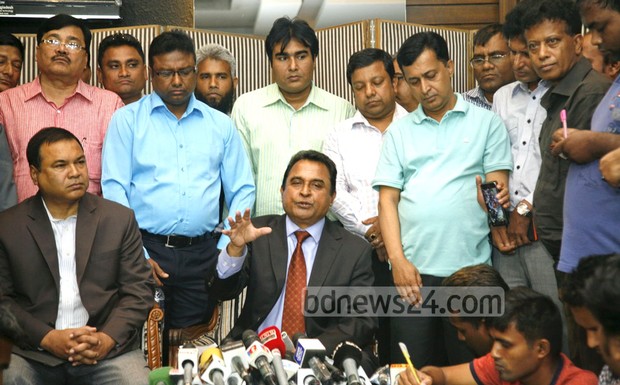Md. Rizwanul Islam
During his pursuit for the office of president of the International Cricket Council (ICC), Mr. Kamal apparently promised that the national cricket team of Bangladesh would tour Pakistan. Like millions of Bangladeshi fans I too was incensed that he could brazenly put the lives of our sporting heroes on the line for fulfilling his personal ambitions.
Yet, I think that by his resignation from the ICC’s presidency, he not only gained the respect of millions of Bangladeshis (and perhaps many cricket-lovers beyond our shores if fans at the Melbourne Cricket Ground stridently booing the all powerful chairperson of the ICC is reflective of the mood of fans in general), but has also done service to many voiceless cricket fans across the world (including I would imagine some dispassionate ones in India) who are fed up with the current unbridled ‘dash for cash’ modus operandi of the ICC.
Many realists have claimed that the furious response of Mr. Kamal and Bangladeshi cricket-fans regarding the ‘human errors’ committed by the umpires are irrational and have gone overboard, which would ultimately do a disservice to the cricket of Bangladesh.
However, I think that more than the dubious decisions of the umpires, it is the rushed nature of their decisions that has infuriated the fans. When in these days, even after a batsman is being clean bowled, umpires often check the replay to confirm if it is a legal ball, the swift nature of the umpire’s calls in the quarter final match between India and Bangladesh was strikingly awkward.
It is even more awkward and unacceptable that official scoreboards displayed advertisements chanting ‘Jitega bhai jitega, India jitega’ as if everything was tailor-made for one of the two competing teams (not to imply that the match was fixed), and the other was just there to fill the numbers. After all, umpires taking split-second decisions may be excused for ‘human error,’ but the gravity of organisers running such prejudiced advertisements even after protest by the president of the ICC, cannot be brushed aside.
Some have taken Mr. Kamal to task for openly challenging the umpires. According to them, as an administrator of the ICC, he could not question the umpires, and had to defend even the indefensible. However, this line of criticism ignores some basic facts.
Firstly, Mr. Kamal was holding an administrative post and not a judicial one. And let us not forget that he was nominated to the ICC by the Bangladesh Cricket Board (BCB). Let us also not forget that, unlike Indian administrators unabashedly baying for the head of umpire Steve Bucknor after the infamous Sydney test, Mr. Kamal did not seek to make the game a hostage.
The way the ICC has defended the umpires and assailed Mr. Kamal, would imply that he had very few alternatives. For sure, his choice of words could have been more polished, but he was fully within his rights to question some of the events of that day, particularly the advertisements chanting‘Jitega bhai jitega, India jitega.’ In any case, had Mr. Kamal committed any breach of the ICC’s rules, he could have been asked to provide explanation, and if his explanation was insufficient, he could have been removed from the ICC. However, to shove him aside from the presentation ceremony of the World Cup Final was a blatant disregard of the ICC’s Constitution.
Events unfolding later this month when the ICC’s board will meet, may reveal if Mr. Kamal has his sympathisers in the ICC or not. Or in other words, if his resignation is solely driven by principle or is it partially backed by diplomacy. Mr. Kamal in his conversation with the journalists has attempted to distinguish Mr. Srinivasan from the Board of Control for Cricket in India (BCCI), implying that there may be something more to it.
Only time can tell if this is just a strategic choice of words to avoid pitting the BCB against the mighty BCCI, or that there may be some other imminent material reasons. Mr. Srinivasan is such a polarising character, that the possibility of Mr. Kamal having his sympathisers even in the BCCI, however remote, cannot be ruled out.
If his resignation from an essentially symbolic position can give a shake up to anything in the ICC – an organisation in denial mode, it would be a positive outcome. Some may dismiss the value of his resignation by stating he has simply averted an impending forced removal from the ICC, but it seems that such a possibility was far-flung.
And even if, for the sake of argument, we accept that such a possibility existed, he would deserve respect for being wise. After all, he was brazen enough to assail the ICC’s establishment in such a way that they could mull such an unprecedented step.
It is quite possible the ICC would be in its customary denial mode and dismiss, or maybe even worse, seek to undermine Mr. Kamal further for his undiplomatic criticism of the umpires. It is not also improbable that the BCB would be pushed further into the corner. Indeed, an international sporting organisation being run by a man who is deemed to be unfit to run his nation’s domestic league is so ludicrous, that to expect something otherwise from the ICC is unrealistic.
Realists may squabble about the utility of Mr. Kamal’s resignation, but it can be said that while the resignation may be seemingly fruitless, it is not futile. To hopelessly fight against a mighty opponent may make one seriously bruised, but to silently go through indigent treatment would make one a constant loser.
Source: bd news24

